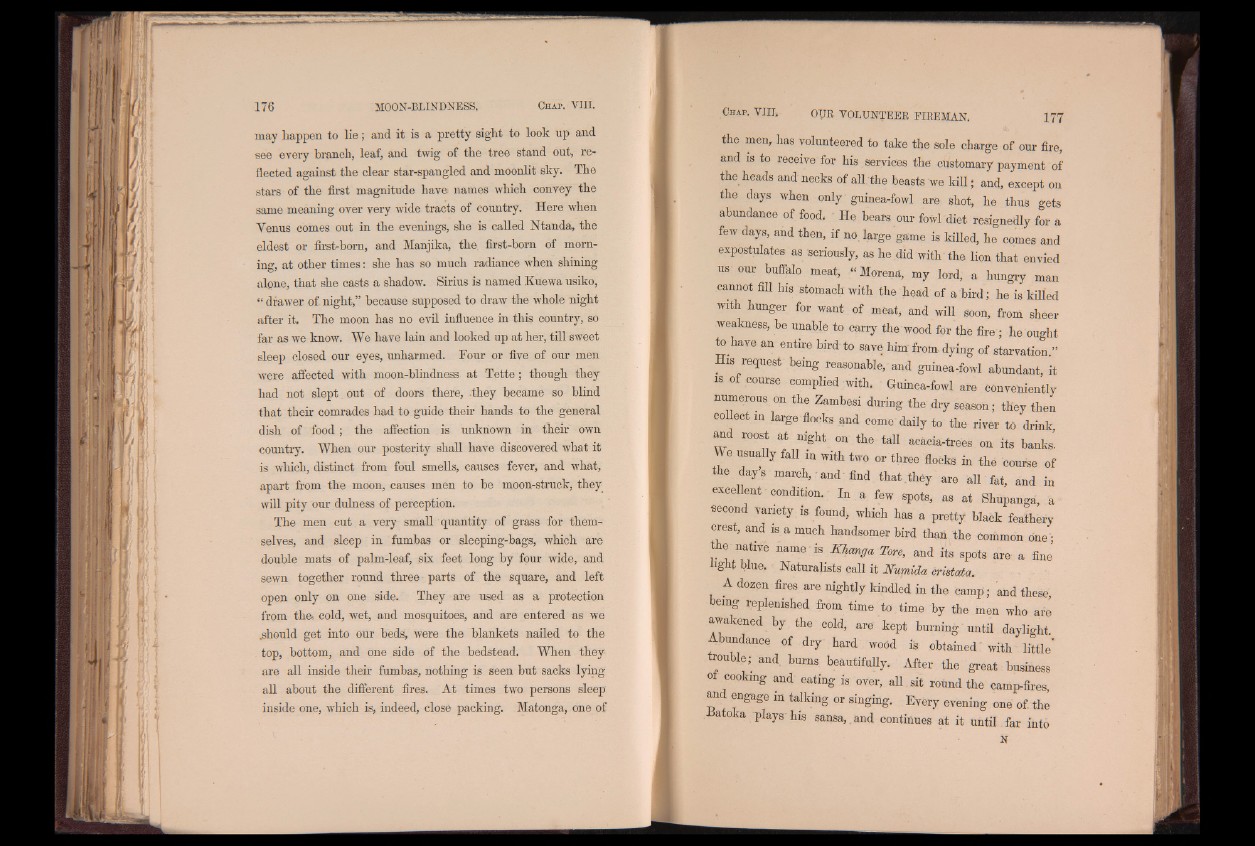
may happen to lie ; and it is a pretty sight to look up and
see every branch, leaf, and twig of the tree stand out, reflected
against the clear star-spangled and moonlit sky. The
stars of the first magnitude have names which convey the
same meaning over very wide tracts of country. Here when
Venus comes out in the evenings, she is called Ntanda, the
eldest or first-born, and Manjika, the. first-born of morning,
at other times: she has so much radiance when shining
alone, that she casts a shadow. Sirius is named Kuewa usiko,
“ drawer of night,” because supposed to draw the whole night
after it. The moon has no evil influence in this country, so
far as we know. We have lain and looked up at her, till sweet
sleep closed our eyes, unharmed. Four or five of our men
were affected with moon-blindness at Tette; though they
had not slept out of doors there, .they became so blind
that their comrades had to guide their hands to the general
dish of food; the affection is unknown in their own
country. When our posterity shall have discovered what it
is which, distinct from foul smells, causes fever, and what,
apart from the moon, causes men to be moon-struck, they
will pity our dulness of perception.
The men cut a very small quantity of grass for themselves,
and sleep in fumbas or sleeping-bags, which are
double mats of palm-leaf, six feet long by four wide, and
sewn together round three parts of the square, and left
open only on one side. They are used as a protection
from the, cold, wet, and mosquitoes, and are entered as we
.should get into our beds, were the blankets nailed to the
top, bottom, and one side of the bedstead. When they-
are all inside their fumbas, nothing is seen but sacks lying
all about the different fires. At times two persons sleep
inside one, which is, indeed, close packing. Matonga, one of
the men, has volunteered to take the sole charge of our fire,
and is to receive for his services the customary payment of
the heads and necks of all the beasts we kill; and, except on
the days when only guinea-fowl are shot, he thus gets
abundance of food, He beats our fowl'diet resignedly for a
few days, and then, if no. large game is killed, he comes and
expostulates as seriously, as he did with the lion that envied
us- our buffalo meat, :“ Morena, my lord, a hungry man
cannot fill his stomach with the head of a bird; he is killed
with hunger for want of meat, and will soon, from sheer
weakness, be unable to carry the wood for the fire ; he ought
to have an entire bird to save him from- dying of starvation.”
I is request' being reasonable/and guinea-fowl abundant, it
is of course complied with, Guinea-fowl are Conveniently
numerous on the Zambesi during the dry season; they then
collect m large flocks and come daily to the river to drink
and roost at night on the tall acacia-trees on its banks.
We usually fall m with two or three flocks in the course of
the days march, ■ and find that .they are a llf a t, and in
excellent condition. In a few spots, as at Shupanga, a
second variety is found, which has a pretty black feathery
crest, and is a much handsomer bird than the Common one -
the-native name is Khanga Tore, and its spots are a fine’
light blue. Naturalists call it Numida cristata.
A dozen fires are nightly kindled in the camp; and these,
ng replenished from time to time by the men who are
awakened by the cold, are kept burning until daylight.
Abundance of dry hard wood is obtained-with little’
trouble; and burns beautifully. After the great business
ol cooking and eating is over, all.sit round the camp-fires,
an engage in talking or singing. Every evening one of. the
toka plays his sansa,.and continues at it until far into